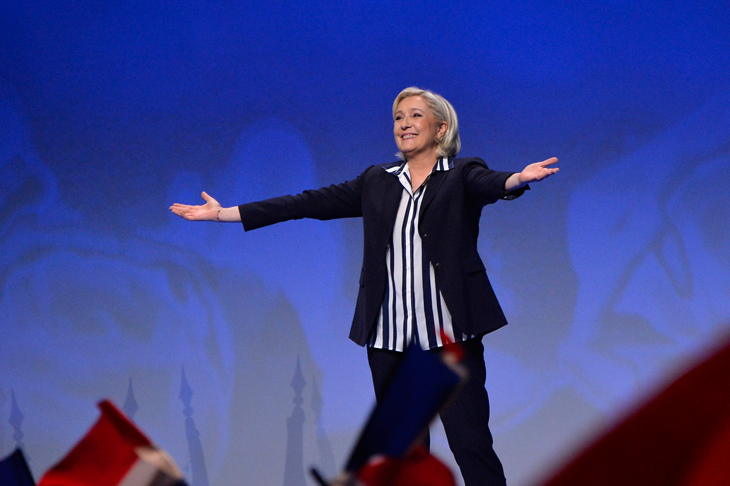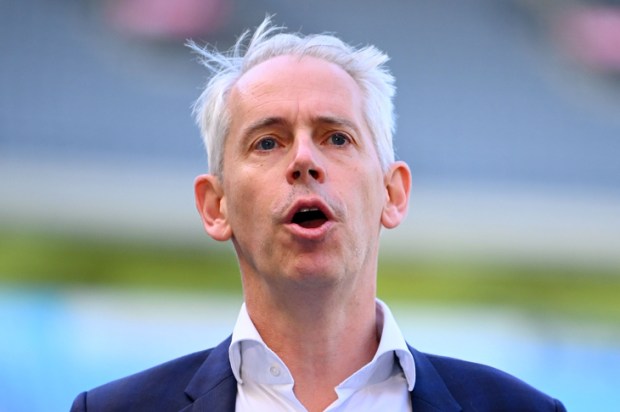If the voters obey the elites and elect Emmanuel Macron, the Fifth Republic may well be doomed, which could have as great an impact on Western civilisation as the Revolution did.
France is approaching one of her regular crises − five within living memory − where her constitutional system is in danger of being swept away, the consequence of putting her revolution on a pedestal. In the time we evolved from a penal colony into one of the world’s oldest continuing democracies, France has been an absolute monarchy, a revolutionary state, five republics, two empires, two constitutional monarchies and a fascist dictatorship.
The Fifth Republic may well fall under a President Macron for the reason that he offers no real solution to the economic crisis which is ravaging swathes of the country with unconscionable levels of youth unemployment, nor to the bloody terrorist war now being waged on the soil of France.
In an opinion piece in Le Monde on the bloody 2016 Berlin Christmas market terrorist outrage, Macron recited the predictable mantra ‘We are all Berliners now’ and then lavishly praised Chancellor Merkel for having saved the EU’s ‘collective dignity’ in rolling over to the uninvited entry of over a million immigrants − mainly young men of military age. If this is recalled before the second round, he will lose even more the confidence of la France profonde.
While Macron endorses open borders and submission to Brussels, what else does this millionaire banker and recent socialist minister believe?
Last year he was in favour of exploiting fossil fuels for energy; this year he’s opposed. Last year he was in favour of decriminalising cannabis; four months later he was opposed. Last year he did not believe ‘for a second’ in governments using ordonnances to ram through legislation without debate; five months later he proposes one. In December 2014 he explains ‘Why I am a socialist’; in August 2016, he declares ‘I am not a socialist’. His campaign manager says this is because he is ‘intellectually from the Left’ and ‘hasn’t distanced himself from the Socialist party’. So much for Macron campaigning as a centrist.
When Macron, who has never held elected office and lacks firm principles, came in just ahead of Mme Le Pen in the first round, he delivered an extraordinarily complacent speech as if he had been elected president. Then he was off to an elite victory dinner at the fashionable brasserie, La Rotonde. He forgot what le tout Paris did not: the outrage which followed Nicolas Sarkozy’s elite victory dinner at Fouquet’s after he defeated socialist Ségolène Royal, former partner of President Hollande and mother of his four children.
Charles de Gaulle’s presidential monarchy would be wasted on Macron who will be a mere satrap of Brussels, Berlin, banking and the elites. His only strong words seem to be in threatening retribution to the British for daring to vote for Brexit.
Mme Le Pen has run rings around him in her campaign. When he visited a factory in Northern France to be closed down and moved to Poland she came to the factory gates and announced that the manufacturers would face a hefty tariff on exports to France. The workers cheered her and booed him. Unlike the situation faced by her father in 2002, not all of those defeated in the first round oppose her, with the Gaullist Nicolas Dupont-Aignan agreeing to be her prime minister.
In addition, her supporters are probably more loyal than Macron’s, highly relevant in a country where voting is not compulsory.
Serge Galam, from the prestigious Sciences Po university, has attempted to measure this and concludes that even if early polling suggesting Macron is ahead 60:40 per cent holds, ‘differentiated abstention’ could still result in a Le Pen victory. For example, if 90 per cent of people who said they would vote for Mme Le Pen do so but only 65 per cent of Macron’s do, Mme Le Pen would win with a score of 50.07 per cent.
Mme Le Pen offers France the only hope of regaining her status as a great independent sovereign state, with the power to determine, as homme d’État John Howard famously put it, who will come into their country and the terms on which they will do so. She promises to withdraw from the maze of EU rules which are deindustrialising the country, leaving massive unemployment in its wake. She alone promises to dissolve the no-go caliphates under sharia law that surround Paris and other cities and from which have come a series of terrorist outrages.
For this, she will not hesitate to use the vast powers of the Gaullist presidential monarchy, including the commander-in-chief, all of which would be wasted on Macron .
Presiding over the cabinet she chooses, with her Prime Minister, she will exercise a wide law-making power more akin to that of the ancien régime to hand down decrees or executive orders. The Le Pen administration will be able to ram through bills in areas reserved for acts of parliament without debate through the use of the Gaullist ordonnance, with a recalcitrant Assembly knowing that unlike President Trump, this elected presidential monarch may even dissolve the Assembly, whenever she wishes, and call new elections.
If terrorism continues, or as is possible, becomes even worse, it will be not at all surprising if a President Le Pen were to be only the second president (after de Gaulle of course) to use the extraordinary powers, pouvoirs exceptionnels. If in her opinion, the institutions of the republic, the independence of the nation and the integrity of its territory are under grave and immediate threat and that the proper functioning of the constitutional governmental authorities is interrupted, she is empowered to take the measures she judges are demanded by these circumstances.
To her supporters, only Le Pen can save France from civil disorder and economic ruin. Macron is very much the preferred candidate of the elites, who want him only because he will change little.
Got something to add? Join the discussion and comment below.
Get 10 issues for just $10
Subscribe to The Spectator Australia today for the next 10 magazine issues, plus full online access, for just $10.
You might disagree with half of it, but you’ll enjoy reading all of it. Try your first month for free, then just $2 a week for the remainder of your first year.














Comments
Don't miss out
Join the conversation with other Spectator Australia readers. Subscribe to leave a comment.
SUBSCRIBEAlready a subscriber? Log in